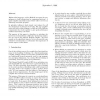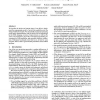121
Voted
JFP
2002
15 years 1 months ago
2002
Higher-order languages, such as Haskell, encourage the proto build abstractions by composing functions. A good compiler must inline many of these calls to recover an e ciently exe...
127
click to vote
HASKELL
2007
ACM
15 years 6 months ago
2007
ACM
The Glasgow Haskell Compiler (GHC) has quite sophisticated support for concurrency in its runtime system, which is written in lowlevel C code. As GHC evolves, the runtime system b...
117
click to vote
FP
1992
15 years 6 months ago
1992
In this paper we describe a series of program transformations that are currently being implemented in the Glasgow Haskell Compiler. They are semantics preserving program transform...
109
click to vote
SAC
2004
ACM
15 years 7 months ago
2004
ACM
is an abstract graph reduction machine for the implementation of lazy functional languages. Categorical multi-combinators served as a basis for the evaluation model of µΓCMC. Th...
HASKELL
2005
ACM
15 years 7 months ago
2005
ACM
Multi-core processors are coming, and we need ways to program them. The combination of purely-functional programming and explicit, monadic threads, communicating using transaction...
132
click to vote
TLCA
2009
Springer
15 years 8 months ago
2009
Springer
Types play an important role both in reasoning about Haskell and for its implementation. For example, the Glasgow Haskell Compiler performs certain fusion transformations that are...
ICFP
2007
ACM
16 years 2 months ago
2007
ACM
User-defined data types, pattern-matching, and recursion are ubiquitous features of Haskell programs. Sometimes a function is called with arguments that are statically known to be...
207
click to vote
POPL
2007
ACM
16 years 2 months ago
2007
ACM
We describe the design and current status of our effort to implement the programming model of nested data parallelism into the Glasgow Haskell Compiler. We extended the original p...
240
click to vote
POPL
2007
ACM
16 years 2 months ago
2007
ACM
Constraint Handling Rules (CHR) is a concurrent committedchoice constraint logic programming language to describe transformations (rewritings) among multi-sets of constraints (ato...


